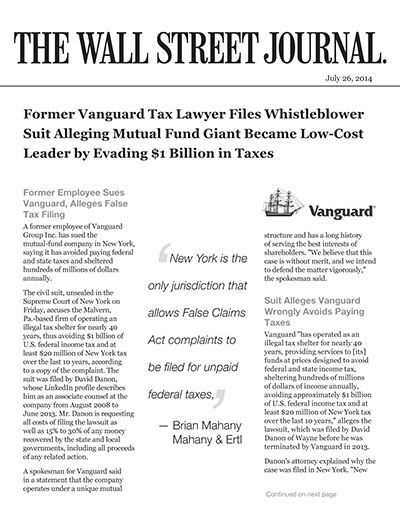A former employee of Vanguard Group Inc. has sued the mutual-fund company in New York, saying it has avoided paying federal and state taxes and sheltered hundreds of millions of dollars annually.
The civil suit, unsealed in the Supreme Court of New York on Friday, accuses the Malvern, Pa.-based firm of operating an illegal tax shelter for nearly 40 years, thus avoiding $1 billion of U.S. federal income tax and at least $20 million of New York tax over the last 10 years, according to a copy of the complaint. The suit was filed by David Danon, whose LinkedIn profile describes him as an associate counsel at the company from August 2008 to June 2013. Mr. Danon is requesting all costs of filing the lawsuit as well as 15% to 30% of any money recovered by the state and local governments, including all proceeds of any related action.
A spokesman for Vanguard said in a statement that the company operates under a unique mutual structure and has a long history of serving the best interests of shareholders. "We believe that this case is without merit, and we intend to defend the matter vigorously," the spokesman said.
Philadelphia Inquirer, Suit Alleges Vanguard Wrongly Avoids Paying Taxes
Vanguard "has operated as an illegal tax shelter for nearly 40 years, providing services to [its] funds at prices designed to avoid federal and state income tax, sheltering hundreds of millions of dollars of income annually, avoiding approximately $1 billion of U.S. federal income tax and at least $20 million of New York tax over the last 10 years," alleges the lawsuit, which was filed by David Danon of Wayne before he was terminated by Vanguard in 2013. ...
Danon's attorney explained why the case was filed in New York. "New York is the only jurisdiction that allows False Claims Act complaints to be filed for unpaid federal taxes," said Brian Mahany of Milwaukee. "We believe he was terminated because, even though this was under seal, they figured out he was a whistle-blower."
In an interview with The Inquirer, Danon, a 1998 magna cum laude graduate of Fordham Law School who worked at Sullivan & Cromwell L.L.P., Cleary Gottlieb Steen & Hamilton L.L.P., and other New York corporate law firms before joining Vanguard in 2008, said he had voiced his concerns to Vanguard officials and finally went outside the company when they refused to take steps to comply with the law as he viewed it. Danon said other Vanguard principals who disagreed with the company's tax position had also left Vanguard.
Danon has also talked with IRS and SEC investigators about his allegations, The Inquirer has learned. The SEC and IRS typically do not comment on possible investigations.
In the lawsuit, Danon details his allegation that Vanguard has been illegally avoiding taxes.
Section 482 of the Internal Revenue Code, and most state's laws, require that transactions between related companies take place at the same price as if the companies were unrelated. Instead, Danon contends, Vanguard provides services to its mutual funds "at artificially low, 'at-cost' " prices. "As a result, Vanguard shows little or no profit and pays little or no federal or state income tax despite managing funds with nearly $2 trillion in assets." This is illegal for the same reason rich people are not allowed to sell property to their children at artificially low prices to avoid inheritance taxes, the lawsuit says. It is a "bedrock tax principle" and what lawyers call "black-letter law," generally accepted by lawyers and courts, the suit adds.
Danon also alleges that "Vanguard knowingly and fraudulently failed to report and pay taxes on its $1.5 billion 'Contingency Reserve,' avoiding approximately $500 million of U.S. federal income tax." The reserve is under Vanguard Group control and used for Vanguard purposes, and has been funded by Vanguard mutual fund fees. So, Vanguard should pay taxes on it, the suit contends.
Vanguard's no-tax structure has enabled the company to underprice competitors and grow faster than other companies, the lawsuit argues. Vanguard has been the leader in low-cost mutual funds, it adds, because "it has flouted tax rules."
